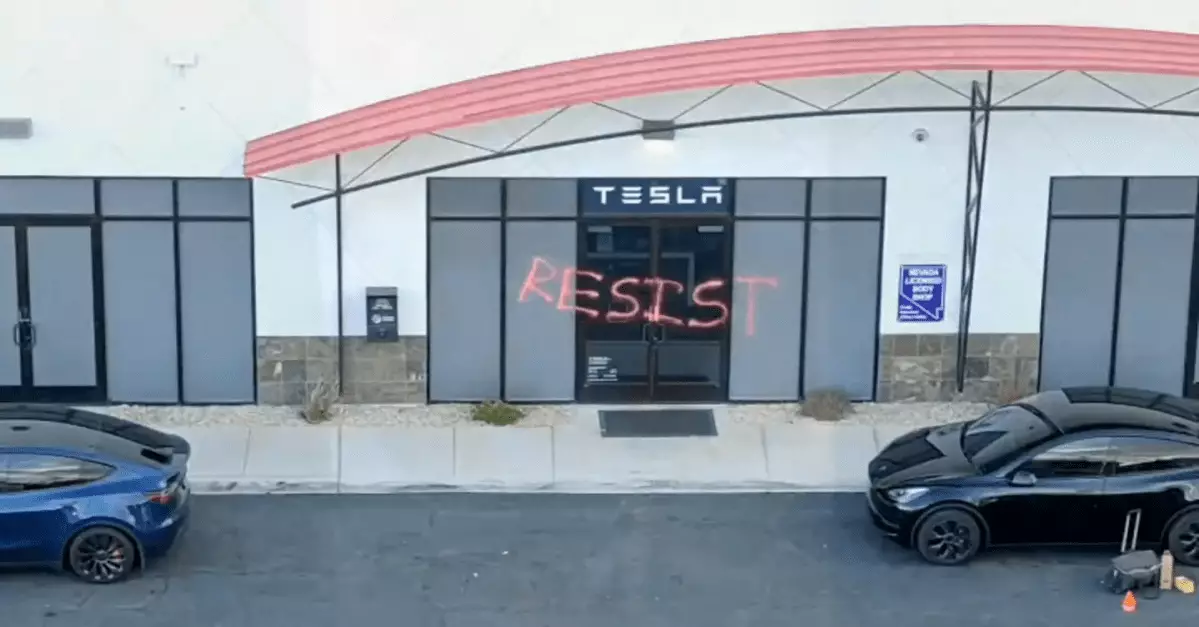The recent surge in vandalism targeting Tesla vehicles has ignited a fierce debate about whether such acts should be classified as domestic terrorism. The Trump administration’s consideration of this classification signals a potential shift in how we view politically motivated crimes, especially against environmentally friendly technologies. Such a decision could redefine the lens through which we evaluate acts of aggression against corporations that symbolize innovation and progress, particularly when it comes to sustainability in the automotive industry.
A troubling incident unfolded at a Tesla collision center in Las Vegas, where an assailant clad in black wreaked havoc using Molotov cocktails and gunfire. This bizarre attack, marked by anti-establishment graffiti, raises pivotal questions about the motivations behind this violence. Are we witnessing a backlash against the electric car movement, or is it a broader commentary on societal discontent with transformative technologies? This incident wasn’t an isolated occurrence; it mirrored similar destructive actions elsewhere, including a fire involving Tesla’s Cybertruck in Kansas City, further evidencing a concerning trend of aggression toward electric vehicles.
The Role of Technology in Modern Crime
It is worth examining how technology itself plays a dual role in both perpetrating and combating crime. In an age where electric vehicles are part of a burgeoning eco-conscience, the attack on Tesla represents a paradoxical rejection of innovation for the sake of nostalgia or ideology. These vehicles, which are often seen as harbingers of a cleaner future, are now a target for aggression. Analyzing these incidents invites us to consider the implications of using modern technology as a weapon against symbols of progress.
Furthermore, the increasing involvement of the FBI’s joint terrorism task force signals a serious approach to these acts of vandalism. It highlights how law enforcement agencies are beginning to take environmental crime seriously, understanding that these attacks are not mere acts of vandalism but potentially threats to the societal fabric in which we live. As Special Agent Spencer Evans cautioned potential offenders, the ramifications of their actions extend beyond property damage; they can lead to a wider discussion about the societal impact of stifling technological advancements meant to alleviate humanity’s impact on the planet.
Public Discourse and Leadership Response
Tesla’s CEO, Elon Musk, promptly labeled the incidents “terrorism,” asserting that the company has only ever aimed to innovate with electric cars. His public response not only illustrates the importance of corporate leadership in times of crisis but also sheds light on the broader societal implications of such attacks. When a prominent figure takes a firm stance against systemic violence aimed at innovation, it compels public discourse to confront uncomfortable truths about how technological disruption incites backlash.
This raises significant questions about the future interplay between innovation and public response. Will communities rally around the defense of electric vehicles as essential tools for combating climate change, or will we continue to witness a polarization that breeds violence? In greater detail, how might this tension influence policies regarding electric vehicle adoption moving forward? The outcomes of these discussions may shape not just the future of transportation but also signify a pivotal moment in societal attitudes toward progress versus preservation.

